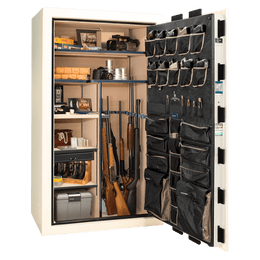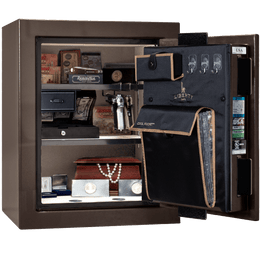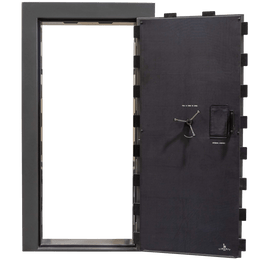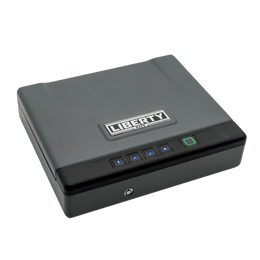With the huge increases in social unrest and economic uncertainty over the past few years, there has been an explosion of interest in firearms ownership and personal defense in the US. Firearms sales have tripled over the last 15 years. One of the most asked questions that people in the firearms industry (or adjacent markets, such as gun safe manufacturers) receive is how people can get a permit to carry a concealed firearm.
This is a good thing because it means that people are taking the concept of being armed seriously. In this article, we will review some basic information regarding getting a concealed weapon permit such, as a handgun: How do you get a concealed carry permit? Do you even need one? What are some of the benefits of obtaining a permit? Let’s get started.
Important note: We have made a reasonable attempt to provide accurate information as of the time of publication, but firearms laws vary widely from state to state and even within jurisdictions in the same state in some cases. Laws can and do change frequently. We are not lawyers nor legislators, but provide this article for general, informational purposes only. Neither Liberty Safe nor the author assumes any liability for using or misusing this information. It is YOUR responsibility to read, understand, and follow all applicable laws when carrying a firearm in any state.
What is a concealed carry permit? (CCW, CCP)
A concealed carry permit is a legal document or permit issued by a state, district, or jurisdiction that allows the holder to carry a concealed weapon, typically a handgun, on their person and/or in their vehicle. Different states and jurisdictions use different terms for this type of permit, including (but not limited to):
- CCW: Carrying a Concealed Weapon (or Concealed Carry of a Weapon)
- CPL: Concealed Pistol License
- CHL/CHP: Concealed Handgun License/Permit
- CWP/CWL: Concealed Weapon Permit/License
- CDWL: Concealed (Defensive/Deadly) Weapon Permit/License
- CCP/CCL: Concealed Carry Permit/License
- LTC/LTCF: License To Carry (Firearms)
- CCDW: Carry of Concealed Deadly Weapon license
For this article, we will stick mainly with CCW as it’s one of the more widely used terms. Note that different states also have varying laws about what firearms or weapons are legal to carry concealed, and it’s not practical to list them all here. So be sure to read up on your local laws.
How do I get a concealed carry permit?
Every state (and often different counties or large cities) has different procedures for obtaining a CCW permit. Some of the best information about obtaining a concealed carry permit is often your state’s government website, which usually has details about CCW permits and requirements to obtain one. Local gun shops or shooting ranges are also good places to ask. Often a range will provide classroom space and range time for any required classes or live-fire training, and employees will be able to help you understand what’s necessary in your location to obtain a permit. The process may differ significantly from state to state, but typically some form of the following steps are required:
1. Attend a state-authorized concealed carry class
Completing a CCW class may be required in your state if you wish to obtain a permit, and in our view, attending a class is usually a good idea. Even if you have firearms training or have attended a CCW course previously in another state, it’s good to go over any new information and freshen your understanding of the local laws. Instructors typically go over safe gun handling, nuances or recent changes in local firearms laws, basic defensive tactics and awareness, and may recommend equipment such as concealed carry holsters or recommended CCW pistols. They may also have information on other personal defense courses, such as self-defense for women.
Note that in addition to classes authorizing your state’s permit, there are often available classes that meet the qualifications for obtaining other states’ non-resident CCW permits. In some cases, a single class may cover the requirements for obtaining permits for more than one state (Utah and Arizona non-resident CCW permits, for example).
2. Demonstrate competent, safe use of a firearm
This requirement varies widely, but an applicant for a CCW permit must usually demonstrate safe firearm handling to an instructor and sometimes pass a live-fire shooting test at a range. Some states will waive the latter requirement if you hold a Hunter Safety certificate since most Hunter Safety classes require live fire/accuracy testing. Sometimes, a CCW class will include range time and a shooting evaluation, and sometimes, classes are informational only and leave the shooting competence evaluation to other entities. In some cases, a live-fire evaluation may not be a requirement.
3. Submit fingerprints and photographs via a local Sheriff’s office or similar
Your individual state and jurisdiction will determine what steps are required, but typically a current photograph and a fresh set of fingerprints will need to be submitted at a local law enforcement office.
4. Pass a stringent state and federal background check
It stands to reason that anyone who wishes to obtain a government permit to carry a concealed weapon in public might need to pass a very thorough background check. Usually, this involves checking both state records and the FBI’s national criminal database. Any violent crime convictions that haven’t been expunged will prohibit a person from obtaining a CCW permit. Additionally, under federal law, people are generally prohibited from purchasing or possessing firearms if they have been convicted of a felony or some domestic violence misdemeanors or if they are subject to certain court orders related to domestic violence or a serious mental condition. In some states, you can be denied a permit if you owe any state taxes.
5. Pay a fee, and renew every 2-5 years
CCW permit fees differ widely, from roughly $10-15 in some states to up to a positively criminal (in our view) $480 in places like New York and California. (Some states don’t require a permit—see below for a list—but may still offer a permit for those who wish to obtain one, and in that case, they typically charge a small fee.) Your CCW permit will usually remain valid for about 2-5 years, and if nothing changes in your residence or other details, you can often renew by mail or online without repeating the whole process every time. The state office/issuer will commonly run a follow-up background check to ensure you’re still a non-prohibited person and charge you a small fee for an updated permit. However, in some very restricted locations, it may be extremely difficult to renew your permit, and you will have to effectively go through all the same steps you followed in the initial process and pay hundreds of dollars every few years to keep your permit valid.
Do I need a permit to carry a concealed firearm in my state?
Today, 42 states have Right to Carry laws on the books, meaning they specifically allow concealed carry either with a state-issued permit or without a permit at all (see below for a list of permitless carry states). Most states are what are called Shall Issue states, meaning that any law-abiding citizen who applies for a permit and meets the requirements Shall be issued a permit (can’t be denied). A few states (Connecticut, Delaware, Hawaii, Maryland, Massachusetts, and New York, along with cities like Chicago) are May Issue jurisdictions that will consider allowing you to exercise your constitutional rights to be armed if you ask nicely, pay a lot of money, and meet their often-confusing criteria, but they can deny you a permit for pretty much whatever reason they see fit. In these states, you often have to prove that you have a valid reason to carry a concealed firearm, and they get to determine a valid reason. Often, because I want to or because I feel the need to protect myself aren’t considered valid enough reasons to be issued a permit.
Technically, all 50 states allow some form of CCW with the proper permission or license. However, the above 6 states have made obtaining a permit so difficult or expensive that they have effectively banned concealed carry for 99.9% of their citizens.
Which states allow permitless concealed carry or Constitutional carry?
Over the past dozen or so years, many states have adopted permitless concealed carry, sometimes known as Constitutional carry. The effective age may vary a bit (18 versus 19 versus 21 years old, for example), and you should check your local laws for restrictions/exceptions (such as in establishments serving alcohol, for some states), but as of 2024, the following 29 states allow some form of legal, permitless concealed carry by non-prohibited citizens (i.e., non-felons):
- Alabama
- Alaska
- Arizona
- Arkansas
- Florida
- Georgia
- Indiana
- Idaho
- Iowa
- Kansas
- Kentucky
- Louisiana
- Maine
- Mississippi
- Missouri
- Montana
- Nebraska
- New Hampshire
- North Dakota
- Ohio
- Oklahoma
- South Carolina
- South Dakota
- Tennessee
- Texas
- Utah
- Vermont
- West Virginia
- Wyoming
There may be some variation among different states. In some states, for example, you must be a state resident for permitless carry to be applicable, but that state might honor CCW carry with a permit from specific other states (see below). Some states allow in-state concealed carry by any US citizen (of any state) who can legally possess a firearm under state and federal law. Be sure to read up on your state (and any other states where you plan to carry concealed) and follow all applicable laws and regulations.
What are the advantages of obtaining a CCW permit in states that allow permitless carry?
You may wonder what the point of obtaining a concealed carry permit is if your state is one of the many that have recently enacted permitless carry. After all, if you can carry without a permit, why would you go through the trouble and expense of getting a permit?
That’s a fair question, and the reasons may vary by state and location. Let’s go over some of the potential reasons why you’d still want to obtain a carry permit in these states.
A CCW permit may allow legal carry in otherwise restricted locations or situations
In many states, even those that allow permitless carry for their residents, that legal carry is still somewhat restricted to certain areas and situations. For example, in one state, you may be legally permitted to carry on a state-funded college campus if you have a state-issued CCW permit, but you may not be able to without a permit. In another state, you may be restricted from carrying a concealed firearm in a bar or other venue that serves alcohol unless you have a valid CCW permit. National/State parks and some government buildings are other common locations where concealed carry is often restricted without a special permit (and in some cases, it can be restricted even to CCW permit holders, depending on the state). Some businesses may have the legal right to restrict legal CCW carry for non-permit-holders, but the law may technically permit concealed carry for those who have obtained a permit. So, be sure to read your local laws carefully, and you might be clued into some situations in which having an official CCW permit can still be advantageous.
CCW permit from one state may provide reciprocity in surrounding states, or other parts of the US
Many states have reciprocity agreements with other states regarding legal concealed carry for holders of permits issued by either state. In other words, If you have a CCW permit issued by your home state, it may also be valid in another state and vice versa. In some cases, a state may be fairly restrictive in issuing permits to its own citizens, but those citizens can apply for permits from other states so they can legally carry concealed while visiting those states. Every state’s policy on CCW permit reciprocity is different, but IN GENERAL, if a state has moved to a permitless carry paradigm, it will usually honor valid concealed carry permits from all other states. If you live in a state that does not allow permitless carry (but still issues CCW permits to citizens who qualify), it can be very useful to know which other states may honor your permit while you visit those states.
For example, Utah’s BCI page detailing which permits are reciprocal in other states. Florida also maintains a page detailing which states Florida has CCW reciprocity with. Colorado honors CCW permits from other states as long as:
- The issuing state recognizes/honors a Colorado permit (CHP).
- The permit holder is a resident of the issuing state.
- The permit holder is in possession of a matching state-issued driver’s license or a State ID showing that they are a resident of that state.
- The permit holder is 21 years of age or older.
- The permit holder is in possession of a valid permit.
As you can see, there are some nuances regarding CCW reciprocity. While many states will honor out-of-state CCW permits even if you are not a resident of the issuing state, some (like Colorado) do not. So be sure to read up on any state’s concealed carry and reciprocity laws before you visit if you wish to legally carry concealed.
A CCW permit may save you some time and money when purchasing firearms
In some states (Utah, for example), if you have a valid, current Concealed Firearms Permit, the FFL (Federal Firearms Licensed) dealer selling you a gun will waive the Bureau of Criminal Identification (BCI) background check and the corresponding fees. Since you already went through a rigorous background check when obtaining your permit, the background check doesn’t need to be performed every time you purchase another firearm, assuming your permit is still valid. The dealer will still call the state authority and confirm the validity of your permit, but in many cases, they will waive the fee. This can save you a bit of dough, particularly if you buy a few guns per year… and certainly it is nice to not have to wait for the BCI to perform the background check every time and notify the FFL.
A CCW permit usually qualifies as a valid form of state-issued ID
In situations where you need to produce 2 forms of ID, a CCW permit often counts as one of them. This can be convenient since you typically carry it at all times, similar to your driver’s license.
A CCW permit may add credibility in some legal and social situations
Generally, we advise people to keep their CCW practices to themselves for matters of security and avoid social shaming, family contention, employment trouble, or other issues. However, in some situations, having a state-issued permit may allay some people’s concerns about your qualifications or capability while carrying a concealed firearm. For example, a concerned family member who learns you carry concealed might be mollified a little if you inform them that you had to take a class, get a background check, get fingerprinted and photographed, and pass a live-fire test to obtain a permit to carry. Or, if you are pulled over in a traffic stop, the police officer may appreciate you notifying him or her that you have a CCW permit and are currently armed. Often, the fact that you have applied for and received a CCW permit will show up on your file when they run your license anyway, and if you let them know in advance, they might gain a more favorable opinion of you than if you don’t volunteer the information. This is situational, depending on personal preference and the trends in your local law enforcement, but if you get the chance, maybe ask a police officer what he or she thinks about it. This is one of the more unlikely benefits of a CCW permit, but it is a potential one to consider.
Store your CCW firearms in a Liberty Safe
Whether you decide to obtain a concealed carry permit or not, be sure to learn and follow all local firearms storage laws and store all your firearms securely when not under your direct control. One of the best ways is in a US-made gun safe from Liberty. A good safe keeps all your firearms and valuables secure from fire, theft, unauthorized access, and environmental damage. Have a look at our interactive online catalog, or check out a Liberty Safe showroom near you.
*Made in the U.S.A. from U.S. and Global Parts.







